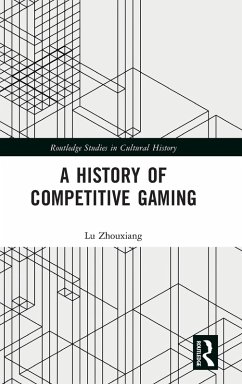Competitive gaming, or esports - referring to competitive tournaments of video games among both casual gamers and professional players - began in the early 1970s with small competitions like the one held at Stanford University in October 1972, where some 20 researchers and students attended. By 2022, the estimated revenue of the global esports industry is in excess of $947 million, with over 200 million viewers worldwide. Regardless of views held about competitive gaming, esports have become a modern economic and cultural phenomenon.
This book studies the full history of competitive gaming from the 1970s to the 2010s against the background of the arrival of the electronic and computer age. It investigates how competitive gaming has grown into a new form of entertainment, a sport-like competition, a lucrative business and a unique cultural sensation. It also explores the role of competitive gaming in the development of the video game industry, making a distinctive contribution to our knowledge and understanding of the history of video games.
A History of Competitive Gaming will appeal to all those interested in the business and culture of gaming, as well as those studying modern technological culture.
This book studies the full history of competitive gaming from the 1970s to the 2010s against the background of the arrival of the electronic and computer age. It investigates how competitive gaming has grown into a new form of entertainment, a sport-like competition, a lucrative business and a unique cultural sensation. It also explores the role of competitive gaming in the development of the video game industry, making a distinctive contribution to our knowledge and understanding of the history of video games.
A History of Competitive Gaming will appeal to all those interested in the business and culture of gaming, as well as those studying modern technological culture.
Professor Lu Zhouxiang has written a highly informative and accessible account of how what we today call "esports" has emerged at the intersection of digital gaming cultures, streaming media and traditional sports. The global international reach and the full variety of video gaming is for the first time combined into a holistic, historical overview on these carefully researched chapters. Any reader, from a student to an expert, will find something new to learn from this book - including accounts of gaming technologies, as well as of the social, cultural, commercial and legal developments that have been underlying the explosive growth of the competitive gaming scene.
- Frans Mäyrä, Professor,
Director of the Centre of Excellence in Game Culture Studies, Tampere, Finland
Lu Zhouxiang provides a comprehensive history of competitive gaming, from the early days of video game history and such things as the Intergalactic Spacewar Olympics, TV Powww, and the Gremlin Girls, to the global, high-stakes, multi-billion-dollar eSports world of today and the obstacles and challenges it faces. Zhouxiang traces how eSports arose after decades of gaming contests and championships, revealing the roots of competitive gaming in the 1970s and 1980s, its blossoming in the 1990s, and its formalization into the eSports organizations of the present day. An indispensable book for anyone interested in the growth of competitive video gaming, and highly recommended.
- Mark J. P. Wolf, Professor,
Concordia University Wisconsin, USA
- Frans Mäyrä, Professor,
Director of the Centre of Excellence in Game Culture Studies, Tampere, Finland
Lu Zhouxiang provides a comprehensive history of competitive gaming, from the early days of video game history and such things as the Intergalactic Spacewar Olympics, TV Powww, and the Gremlin Girls, to the global, high-stakes, multi-billion-dollar eSports world of today and the obstacles and challenges it faces. Zhouxiang traces how eSports arose after decades of gaming contests and championships, revealing the roots of competitive gaming in the 1970s and 1980s, its blossoming in the 1990s, and its formalization into the eSports organizations of the present day. An indispensable book for anyone interested in the growth of competitive video gaming, and highly recommended.
- Mark J. P. Wolf, Professor,
Concordia University Wisconsin, USA

